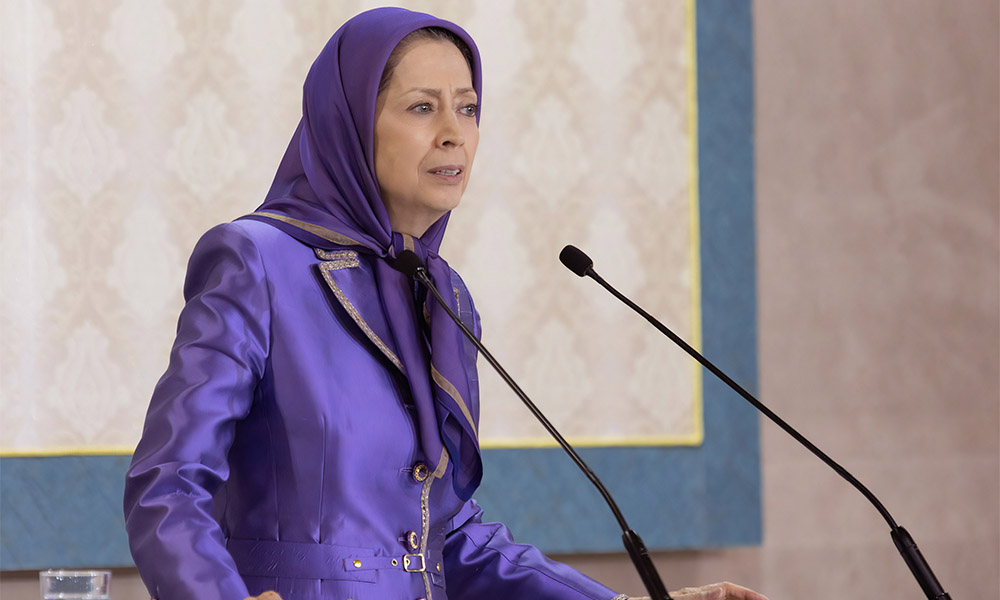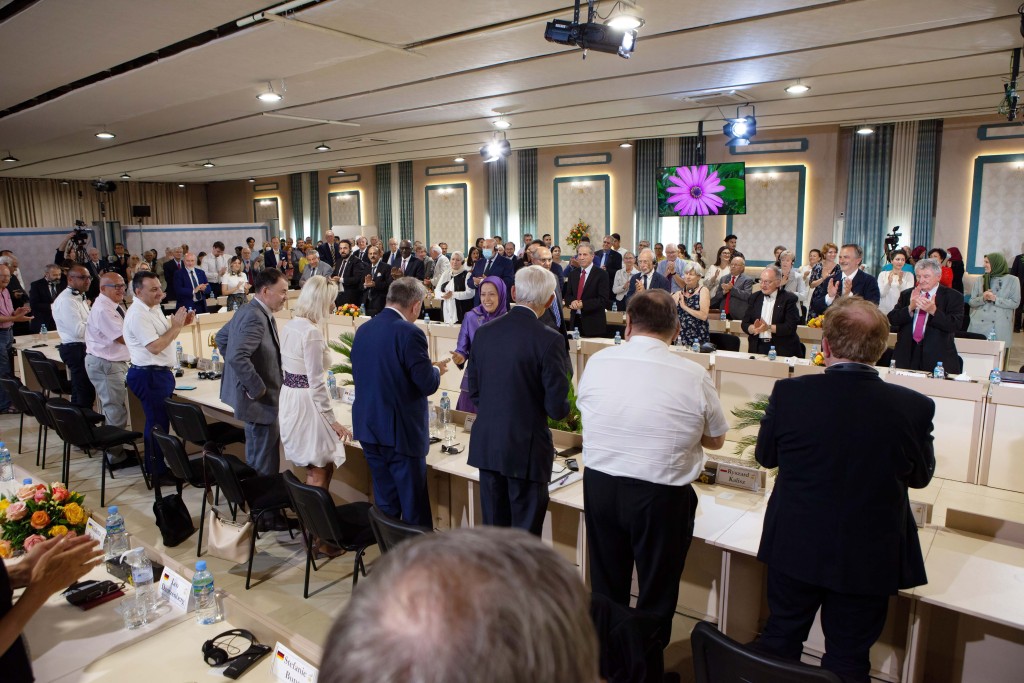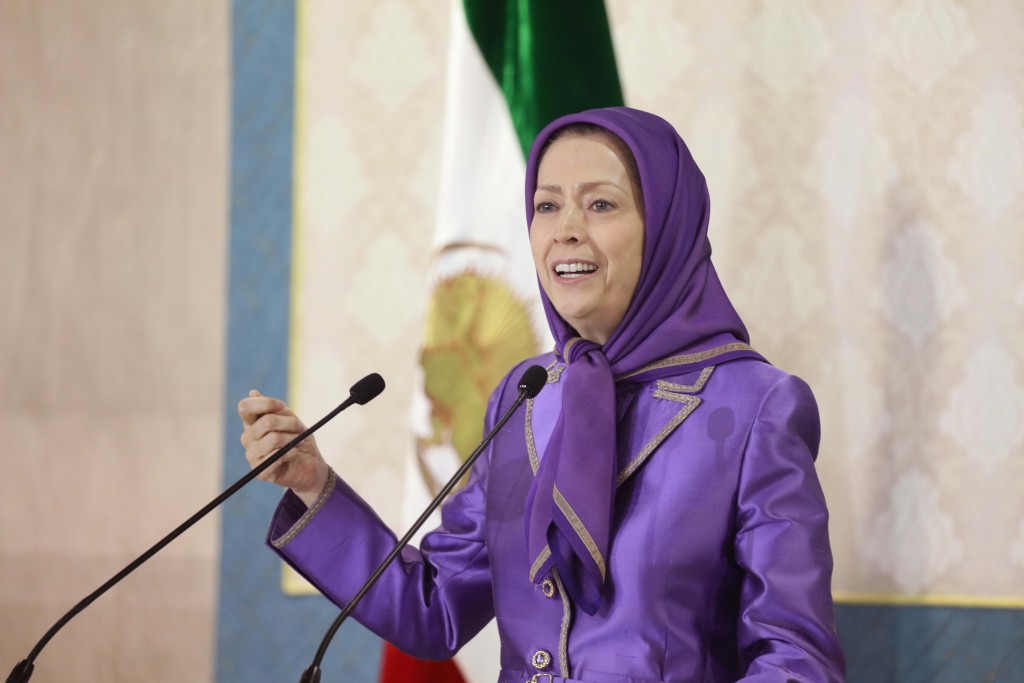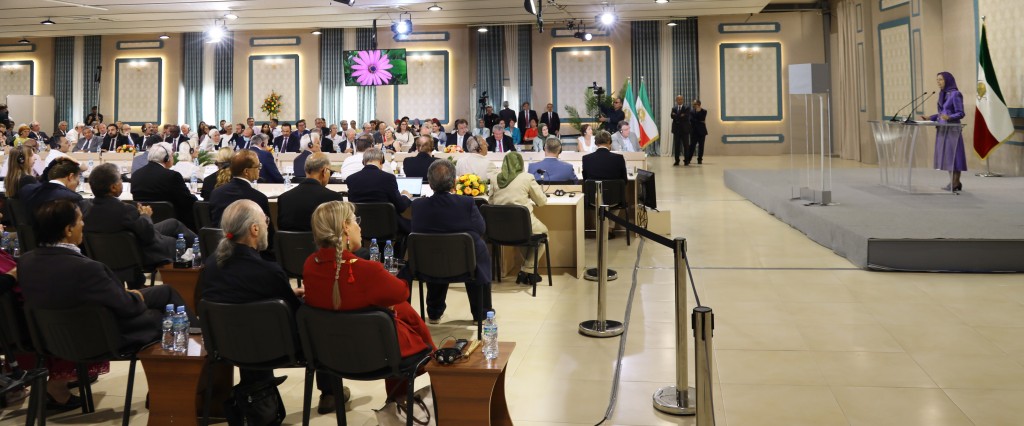Maryam Rajavi: The only right and effective response to religious fascism is firmness not caving in

Speech to a gathering of political and international dignitaries
Honorable legislators, freedom-loving dignitaries,
Dear friends,
I am truly delighted to see you again. Over the past two years, we were unfortunately deprived of getting together. Ashraf residents are thrilled to see you here in Ashraf-3 because they can see their friends on difficult days. Those were challenging days, but we overcame all the obstacles with your help and support.
Indeed, you have visited the Iranian Resistance’s museum, which offers only a glimpse of the Iranian people’s pain and suffering and the Mojahedin’s glorious resistance against the regime.
Three realities about Iran
I want to use this opportunity to review the circumstances in Iran.
Three truths about Iran provide a clear picture to every audience.
First, the regime is rotten to the core. Second, the protest movement continues in Iran. And third is the role of the Iranian Resistance in leading the situation towards the regime’s overthrow.
The mullahs are trying to hide, through adventure, threats, and hype, their fear of the regime’s only rival, the Iranian people’s Resistance, which is their Achilles heel.
You, dear friends, have targeted precisely this fundamental weakness of the regime by standing by the Iranian people’s struggle for freedom and democracy. The solidarity of various tendencies in the Arab and Western worlds with the Iranian people’s struggle is not acceptable to the mullahs.
Just recently, 5,000 members of the Resistance Units in Iran sent video messages declaring their readiness to overthrow the regime. The common phrase in their statements was “we can and we must.” We can, and we must, overthrow the religious fascism in Iran. And the Iranian people and Resistance are capable of doing so.
This is a major stride in the Iranian Resistance’s strategy that is working to organize the rebellious youths in Iran so that in combination with the popular uprisings, they can remove the regime from the Iranian people’s path to freedom.
The determining factors in the Iranian situation are changing. One is the Iranian society, which is moving towards overthrowing the regime. The other is the regime’s dire circumstances. Today, one of Khamenei’s urgent problems is the frequent defections from the Revolutionary Guards Corps (IRGC).
A revealing development in recent weeks was the dismissal of a number of the highest IRGC commanders. They included the commander of the special division in charge of Khamenei’s protection and the commander of the IRGC’s Intelligence Organization.

Is the Iranian regime weak or strong?
Those unaware of the situation in Iran and the actual state of the mullahs think that the regime’s export of terrorism or the use of drones and missiles against neighboring countries is a sign of power. Of course, this is a profound mistake.
Domestic suppression or missile launches and war mongering abroad are critical to the survival of the religious fascism. Therefore, the day they give those up, the regime will cease to exist. A dying viper stings until the last moment.
The only way to push back the regime is firmness, and of course, the determining element is the Iranian Resistance.
Our friends from Arab and Muslim countries can recall that Khomeini, the regime’s founder, was at war with the neighboring country, Iraq, for eight years.
Khomeini used to say he would continue the war until the destruction of the last brick of the buildings in Tehran. While in the summer of 1982, it was possible to end the war and establish peace, Khomeini and his regime prevented it. Eventually, the successful operations of the National Liberation Army and Khomeini’s fear of being overthrown forced him to accept the ceasefire. Even then, he acknowledged, I am drinking the poison chalice of the ceasefire.
Currently, the weakness of the regime can be seen in several significant developments, including the continuation of the protest movement, the expansion of the Resistance’s network and its operations inside Iran, the mullahs’ incapability to resolve the social and economic problems, the defections from the IRGC, and the regime’s failure to continue its theatrics about reform and moderation.
Appeasing the savage mullahs
For this reason, the clerical regime has never been so much in need of the West’s appeasement. The mullahs show claws and teeth and churn out anti-Western rhetoric because they need to benefit from the West’s security, political, and financial concessions.
Unfortunately, Western governments have not learned from the disasters of appeasing the mullahs’ regime in the past three decades. The recent treaty between Belgium and the mullahs to hand over a bomb-carrying diplomat-terrorist despite his conviction by the Belgian Judiciary is an example of this policy.
Iranians and supporters of the Iranian Resistance protested this disgraceful deal by holding demonstrations, rallies, and sit-ins in various countries.
Such perseverance, coupled with the Iranian Resistance’s legal actions, has stopped the terrorist’s transfer to Iran. The Court of Appeals of Belgium has undertaken to examine the case.
In the past four decades, there has never been an example where swapping the regime’s imprisoned terrorists for western hostages did not subsequently endanger the lives of western citizens.
Another example is the regime’s nuclear program.
The history of the mullahs’ step-by-step approach to the atomic bomb is the same as the history of giving incentives to the regime.
While Western governments have sat idle for the last two years, the regime has used the opportunity to acquire the bomb, whereas a decisive policy could have stopped them.
One more example is Western governments’ turning a blind eye on human rights violations in Iran.
During the uprising in November 2019, the IRGC received direct orders from Khamenei and massacred at least 1,500 young men and women. Unfortunately, the West chose to remain silent; the same catastrophic silence the West adopted towards the massacre of 30,000 political prisoners in 1988.
In a series of major revelations three months ago, the Iranian Resistance exposed millions of documents from the clerical regime’s Prisons Organization.
I want to recall just one paragraph from those documents: 5,370 prisoners are condemned to death or retribution. Fifty-one of them are sentenced to stoning. Sixty minors are among these death-row prisoners.
Is it truly worthy of humanity to turn a blind eye on these savageries?
The mullahs are so confident of the West’s conciliation that they have sent many of their Intelligence Ministry and Quds Force agents to live in Europe and the U.S. as sleeper cells. There is no shortage of intelligence reports indicating that the mullahs procure from European markets both the equipment needed for their nuclear program and the means of suppressing the Iranian people.
The crux of the matter
is why when the Iranian society is preparing to overthrow the regime, European governments side with the mullahs?
The whole issue is that such assistance to the mullahs to prevent their downfall must be stopped. A policy that has for the past three decades prevented democratic change in Iran must be put aside.
It is now more evident than ever that the Middle East, the Arab World, and the world of Islam, will not experience calm. They cannot remove the obstacles to their political and economic development unless the barriers are removed from the Iranian people’s path to regime change.
The epicenter of the export of terrorism, fundamentalism, and belligerence in the Middle East, the clerical regime, must be eliminated.

The missing link of western politics
Yes, the time has come for a new policy against the regime. The missing link in the policies of the European and American governments is the disregard for the Iranian people, especially their organized resistance. This approach has served the mullahs’ regime.
The governments of Europe and the United States should side with the Iranian people and their demands. Some specific actions are expected from the European governments and from the European Union.
o Designating the entire Ministry of Intelligence and the IRGC as terrorist entities;
o Expelling intelligence and IRGC agents from European soil and depriving them of asylum and citizenship;
o Referring the Iranian regime’s dossier of terrorism, genocide, and crimes against humanity to the UN Security Council and the prosecution of Khamenei, Raisi, and other regime leaders;
o Predicating political and economic relations with the regime on stopping the execution and export of terrorism by the mullahs’ regime; and
o Recognizing the struggle of rebellious youths in Iran against the terrorist IRGC to overthrow religious tyranny.
Of course, as the Iranian Resistance Leader Massoud Rajavi has constantly reiterated: Regime change and overthrowing the mullahs is our responsibility. Our people and the revolutionary pioneers have undertaken this task.
The Iranian Resistance and the democratic alternative of the National Council of Resistance of Iran believe in a democratic republic, gender equality, and the separation of religion and state. They will be the standard-bearers of just relations based on respect for independence, national sovereignty, and coexistence with their neighbors and the entire world.
I am convinced we will always have you by our side in this liberating struggle.
Thank you all.

- Tags: Atomic, fundamentalism, Iran, mullahs' regime

